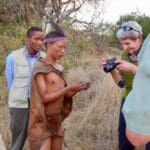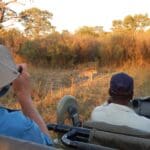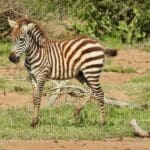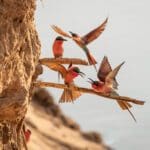The absolute essence of a safari with African Encounters is the wildlife that we get to experience. Africa is full of majestic creatures that we are all in awe of when we see them on safari.
But it’s no secret that wildlife populations are dwindling around the globe. Some species are on the brink of extinction – pushed to the very edges of their shrinking habitats by an ever-expanding human population.
If we are all in awe of these creatures, why can’t we as a race do more to protect them?
Conservation efforts to preserve animals and their ecosystems are often focused on developing nations. They operate in and around local communities who depend on the resources of those precious areas for survival.
This is why it is so important to include these communities in conservation efforts and to support them with ecotourism. Without their buy-in and support, it can be extremely difficult to make a substantial difference.
How Can We Make A Difference?
If we are not careful, the only wildlife that will remain will be bred in captivity – housed in zoos and in protected reserves. But that is not exactly living wild, is it?
So we need a different approach.
One of the ways we can make the most impact when it comes to saving wildlife is to increase their natural value. That doesn’t mean putting a dollar value on their heads! It means increasing the overall value that wildlife brings to local communities.
Ecotourism is one way we can do this.
What Is Ecotourism?
Ecotourism is a special brand of travel. It’s responsible travel, educating visitors on the value of conservation. It provides employment and income for remote communities and funds village water supplies, schools and clinics.
It’s the kind of adventure we offer here at African Encounters, supporting the communities we are privileged to visit, and contributing to wildlife conservation and the environment.
Many people travel to Africa to see “the big five” – lion, leopard, rhinoceros, elephant and buffalo – along with many other incredible species.
But conservation efforts need to stretch beyond National Parks and Reserves for local communities to appreciate it’s value.
Extending Conservation Efforts
While there are large amounts of protected land in the form of national parks, the ongoing threats to wildlife mean that conservation efforts must also expand to include areas outside of these reserves. Engaging the locals living in and around these beautiful landscapes is essential.
Whether it is providing an alternative income to traditional, destructive practices of hunting and logging, employing locals to manage and protect wildlife, or investing in and educating about sustainable agricultural practices, these communities can make all the difference.
How Can It Be Done?
It is easy for outside observers to call for more conservation and make judgments on those “exploiting” or not protecting their natural bounties. But what we have to take into consideration is the day to day needs and problems of those who live in those areas.
Of particular concern in many places throughout Africa, is human-wildlife conflict.
If you are a local farmer trying to provide food and shelter for your family and the hard-earned crops you slaved over are raided by elephants, again and again, your first priority is not to protect the elephant. It would be to protect your crops and your family.
Understanding the needs and struggles of local communities can help to create real and sustainable solutions. Conservation efforts can work with locals to find solutions that suit both them and the endangered animals that share their landscapes.
How Ecotourism Can Help
Bringing small tour groups into these communities can help provide alternative revenue. This can be done by employing local people as camp staff and guides, opening local restaurants and shops, or supporting them to create products that tourists will buy.
Money raised from ecotourism can help to fund schools, health clinics, and programs that help sustainably manage resources, improve local infrastructure and provide much-needed jobs.
In turn, the community has the energy, support and motivation to stand up and protect the wildlife that is now helping to provide them with everything they need.
Although tourists, non-profit organisations and researchers come and go, it is the local people who live in and manage these areas day after day that can have a long-lasting impact and help to save the wildlife that is valued the world over. If they feel supported and empowered, they can act as powerful guardians.
Would you like to support ecotourism while exploring the wonders of Africa? Then get in touch with us here at African Encounters. We’d love to show you the beauty and vitality of African communities and the wildlife that they support. Give us a call today on 06 976 1118.





